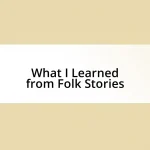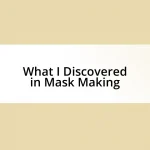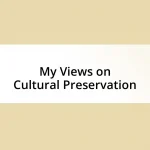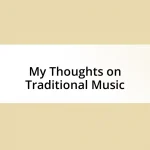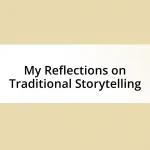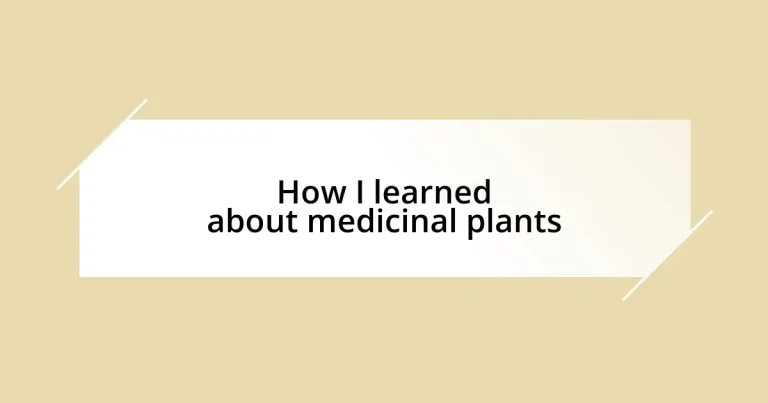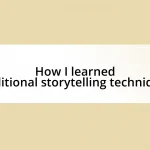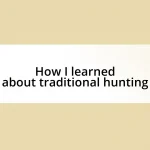Key takeaways:
- Childhood fascination with plants sparked a lasting interest, particularly after discovering herbal remedies in an attic book.
- Engagement with local herbalists and workshops deepened understanding and fostered a sense of community and empowerment in learning.
- Foraging experiences highlighted the importance of ethical gathering and forming a relationship with nature.
- Documenting the learning journey enriched personal insights and connected emotional responses with medicinal plant knowledge.
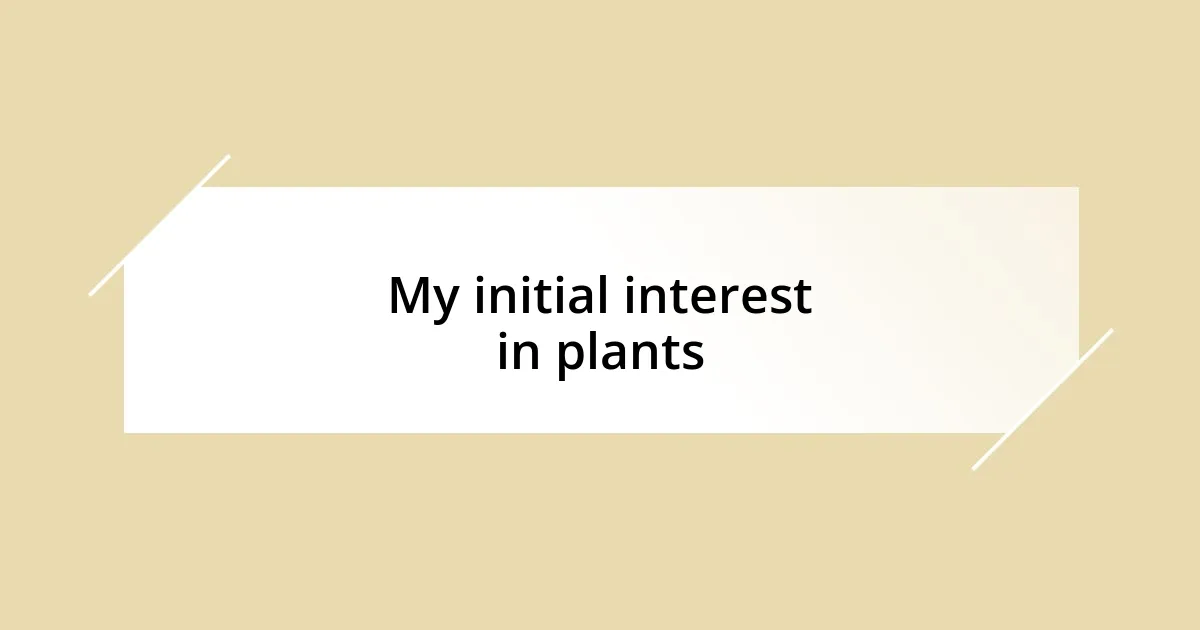
My initial interest in plants
As a child, I often found myself wandering through my grandmother’s garden, captivated by the vibrant colors and distinct scents of each plant. I vividly recall the moment she plucked a leaf from a peppermint plant, crushed it in her fingers, and handed it to me, saying, “Can you smell that? It’s nature’s candy!” That simple interaction opened a door to a world I only began to grasp at the time.
Later, as a teenager, my interest blossomed further when I stumbled upon an old book about herbal remedies while cleaning the attic. I remember feeling an indescribable thrill as I read stories about how common plants could heal ailments; it felt like a treasure trove of secrets waiting to be uncovered. Have you ever experienced that rush of discovery? It ignited a passion within me to explore, to learn, and to connect with the natural world around me.
Years later, when I faced my own health challenges, I turned back to those plants that once fascinated me. The feeling of brewing my first herbal tea was transformational, filling my kitchen with aromas that brought both comfort and curiosity. It made me wonder: what else could these green allies offer? This journey from mere curiosity to a deeply personal exploration is something I cherish and continue to explore.
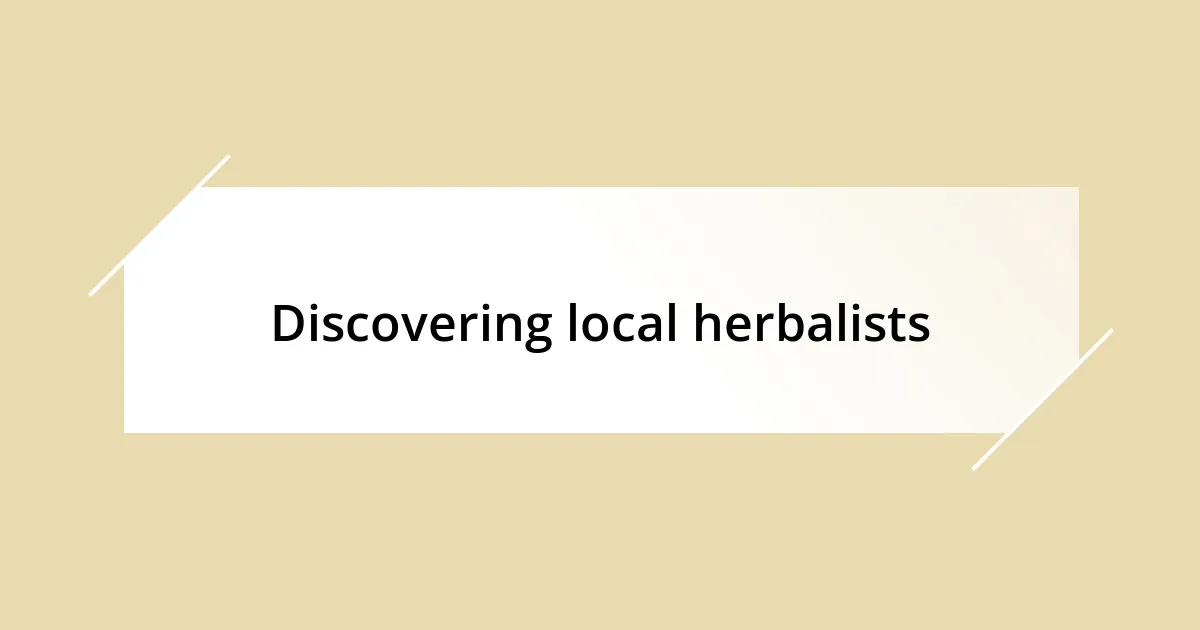
Discovering local herbalists
I quickly found that discovering local herbalists was like striking gold amidst the rubble of city life. One Saturday, while perusing a farmer’s market, I stumbled upon a small booth adorned with jars filled with vibrant dried herbs. The herbalist, an elder with twinkling eyes, shared not just information but stories about each plant’s healing properties. I was drawn in, feeling as if I had been transported to a world where every herb had a tale to tell.
On another occasion, I decided to visit a local herbal shop that had come highly recommended. Walking through the doors, I was enveloped by the warm, earthy scent of herbs and spices. There, I met a passionate herbalist who patiently walked me through the shelves. I remember holding a sprig of rosemary as she explained its benefits for memory and mood, and I felt an overwhelming sense of connection to both the plant and the wealth of knowledge surrounding it. Have you ever felt that spark of inspiration in a seemingly ordinary setting?
These encounters not only deepened my understanding but also cultivated a sense of community. It’s remarkable how local herbalists foster such connections. They often hold workshops or classes, inviting us to learn and engage hands-on. I attended one such workshop where we crafted our own tinctures, feeling empowered as I carefully measured each herb. This experience solidified my belief that the treasures of nature are best explored together, weaving narratives that enrich our understanding.
| Herbalist Experience | Emotional Insight |
|---|---|
| Farmer’s Market | Connection to Nature |
| Local Herbal Shop | Empowerment in Learning |
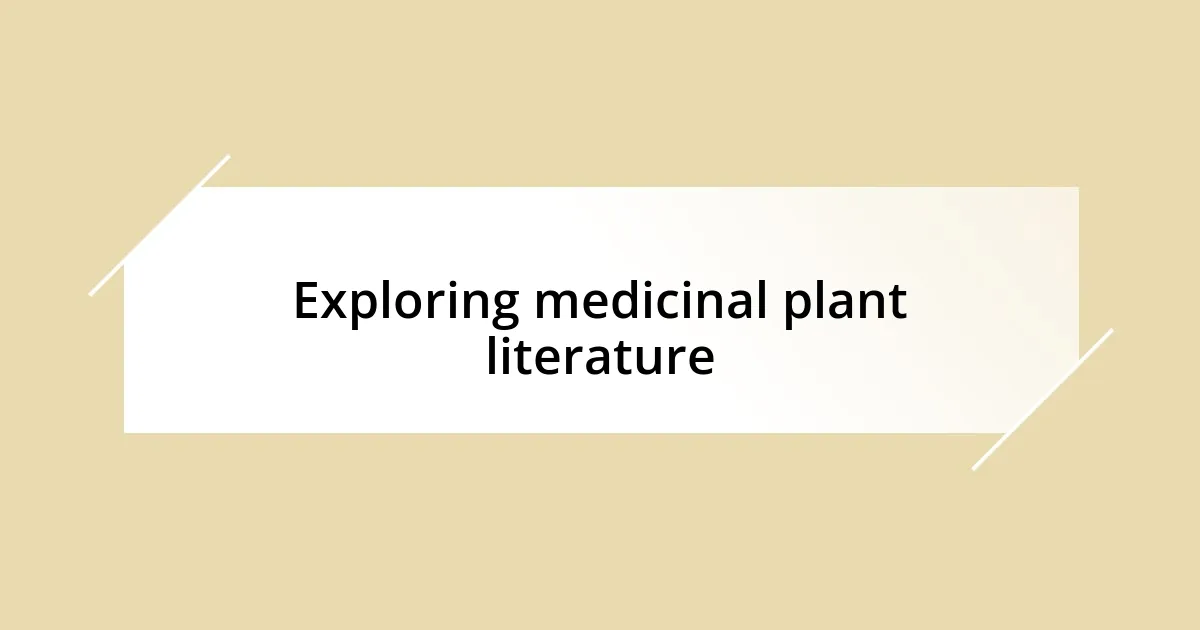
Exploring medicinal plant literature
As I dove deeper into the world of medicinal plants, I discovered that literature on these subjects is a treasure chest waiting to be explored. One weekend afternoon, I found myself cozied up in my favorite reading nook, armed with a cup of chamomile tea and a hand-me-down herbal guide from the 70s. The moment I flipped through its weathered pages, it felt like unlocking forgotten wisdom. I connected with the narratives behind each plant and their uses, feeling as though the authors were whispering secrets meant just for me.
In my quest, I also sought out academic articles and research studies. They provided insight on traditional uses versus modern applications, which is essential for anyone looking to bridge the gap between folklore and science. During one research session, I was excited to learn about adaptogens and their impact on resilience. It was a captivating blend of ancient knowledge and current science, and I couldn’t help but marvel at how interconnected our histories with plants are.
Here are some key aspects I found noteworthy in medicinal plant literature:
- Historical Context: Many plants have been used for centuries, and understanding their history enriches our appreciation.
- Scientific Validation: Numerous studies back traditional claims, providing a modern perspective on age-old practices.
- Cultural Significance: Different cultures use medicinal plants in unique ways, revealing diverse healing approaches.
- Practical Applications: Guides often provide step-by-step instructions for preparing remedies, allowing hands-on experience.
- Personal Narratives: Authors frequently share their journeys with medicinal plants, making the literature relatable and engaging.
Each piece of literature became a stepping stone, guiding me from curiosity to a world where plants were imbued with purpose and meaning.
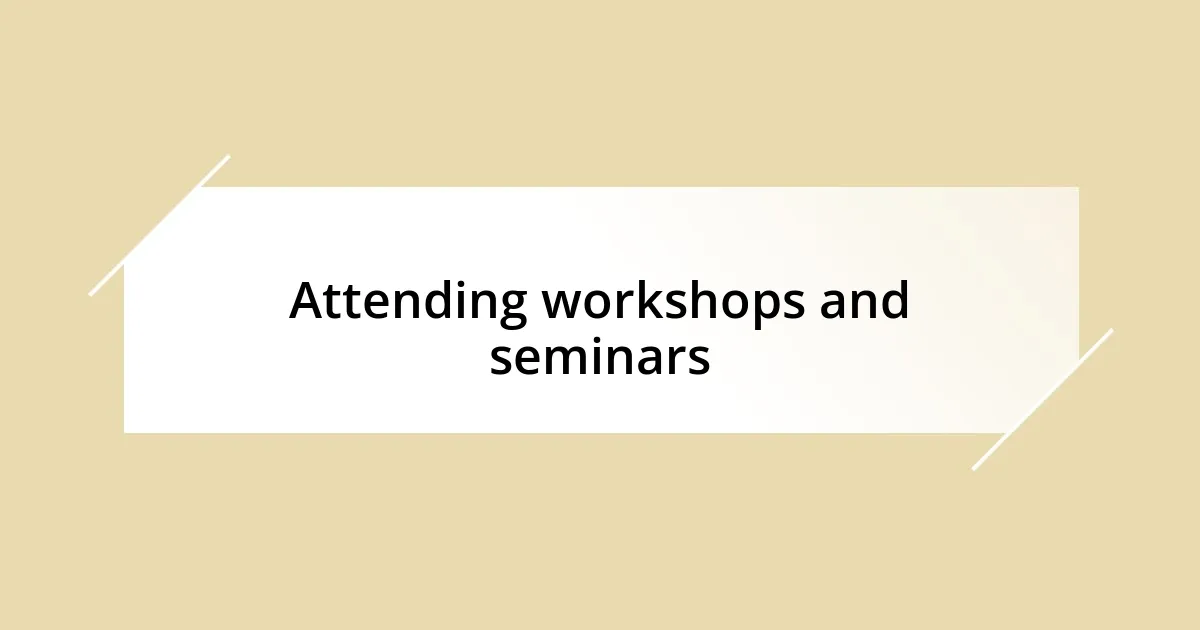
Attending workshops and seminars
Attending workshops and seminars has been a transformative experience for me. I vividly recall a weekend retreat where we not only learned about the properties of herbal remedies but also engaged in making our own salves. The enthusiasm in the room was contagious! Everyone was mixing different oils and herbs, sharing their experiences, and it felt more like a communal adventure than a typical class. Have you ever felt that surge of creativity while surrounded by like-minded individuals?
I also remember a seminar led by a renowned herbalist, where I sat, mesmerized, taking notes like my life depended on it. The way he explained the connections within plant families was almost poetic. It struck me that each plant we discussed had a role in an intricate tapestry of health and well-being—much more than mere ingredients in a remedy. It was in those moments that I realized the depth of knowledge and tradition embraced within this field. Isn’t it fascinating how every plant carries its own story waiting to be discovered?
Through these workshops, I’ve embraced a hands-on approach to learning. It’s one thing to read about medicinal plants in books, but quite another to touch, smell, and taste them firsthand. I once blended my own herbal tea at a class, selecting ingredients based on their aromatic profiles and health benefits. The satisfaction of sipping my creation was immeasurable—like savoring a piece of my journey. I believe these interactive experiences not only deepen our understanding but also foster a vibrant community. After all, who wouldn’t want to share their love for plants with others who appreciate their magic just as much?
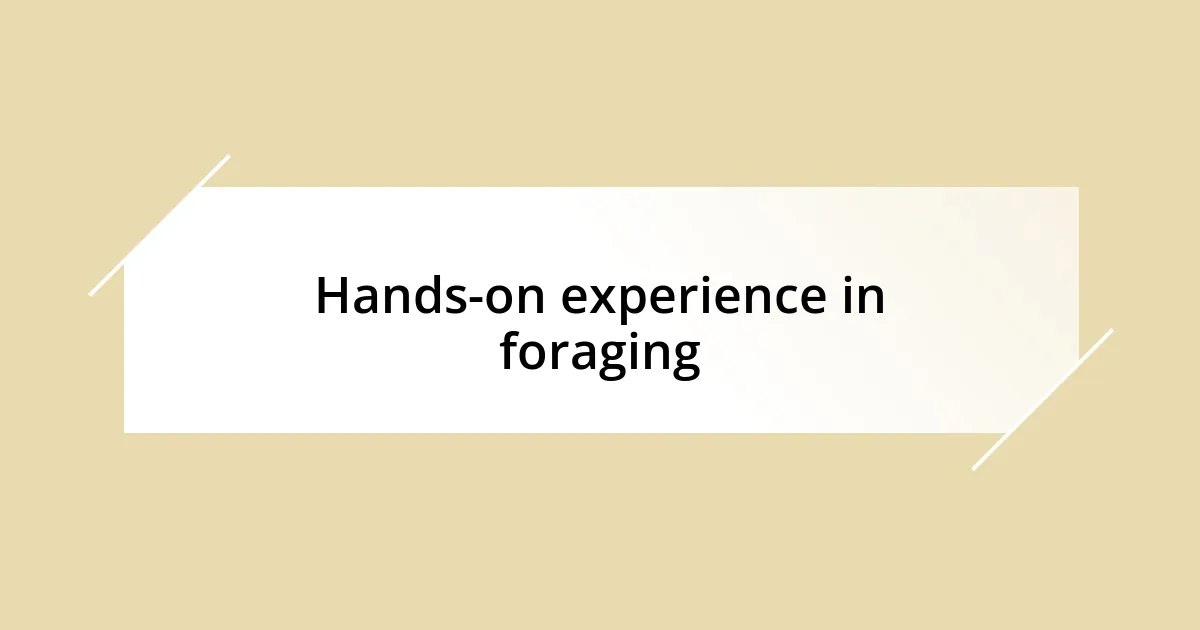
Hands-on experience in foraging
Foraging for medicinal plants has been one of the most enriching experiences of my life. I remember my first outing in a dense woodland, guided by a mentor who was a seasoned forager. With each step, I could feel my excitement bubbling over as we spotted wild garlic, its unmistakable aroma filling the air. Have you ever come across a wild ingredient and felt an instant connection to nature? That day, I learned not just to identify plants but to appreciate their roles in our ecosystem.
One time, while foraging for herbs by a babbling brook, I stumbled upon a patch of St. John’s Wort. I had read about its benefits in literature, but seeing it in its natural habitat made everything come alive. As I gently brushed my fingers over the vibrant yellow flowers, I felt a surge of gratitude for the earth’s bounty. It was in that moment that I realized foraging isn’t just about gathering—it’s about forming a relationship with the plants that thrive around us. Have you ever experienced that kind of bond with nature?
The hands-on experience of foraging also taught me the importance of ethical gathering. I learned to take only what I needed, leaving enough for the plants to continue growing. This respect for the environment deepened my connection to the land. There’s something about being in nature, especially when you’re intentionally seeking out plants, that pulls you out of the daily grind. Just imagine breathing in the fresh air and standing among plants that have been revered for centuries. It’s a beautiful reminder that we are part of a larger tapestry of life, and that understanding it brings us one step closer to true healing.
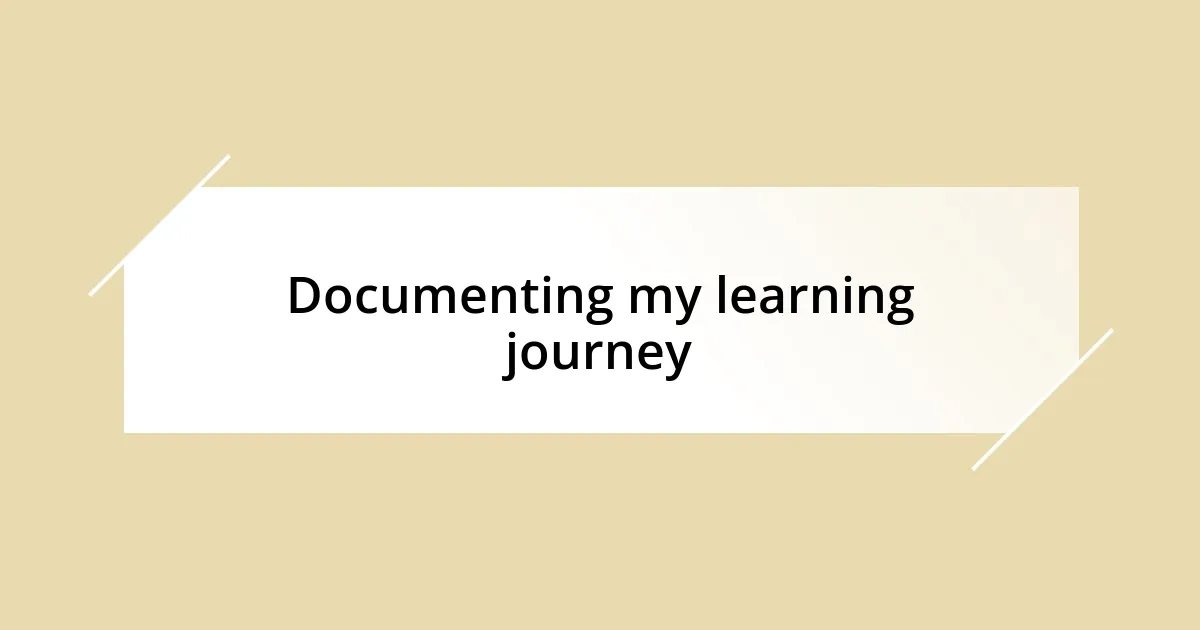
Documenting my learning journey
Documenting my learning journey has been as enlightening as the process itself. I decided to keep a dedicated journal to capture my thoughts, experiences, and reflections on medicinal plants. Each entry became a snapshot of my evolving understanding. Remember the first time you tried writing down your thoughts? I found it both liberating and challenging, connecting my mind more deeply to the knowledge I was gaining.
As I delved into my observations, I began noting specific plants and their properties, alongside drawings and snippets of my emotional responses. One evening, under a canopy of stars, I wrote about the calming effect of chamomile. Sitting there, I felt an overwhelming sense of peace wash over me. I’ve often wondered, what if everyone documented their own journeys with nature? Wouldn’t it be fascinating to see how our individual experiences converge into a collective understanding?
Looking back now, those written reflections serve not just as a record of my studies but as a source of inspiration. They remind me of the excitement I felt during a spontaneous visit to a local herbalist’s garden, where I got to see traditional and lesser-known plants side by side. Each note is a reminder of the wonder I felt when I learned about their medicinal benefits. I can’t help but think: who knew that jotting down thoughts could turn into such a vital part of my personal exploration? It’s an ongoing journey, one that deepens my appreciation for the natural world with every word.
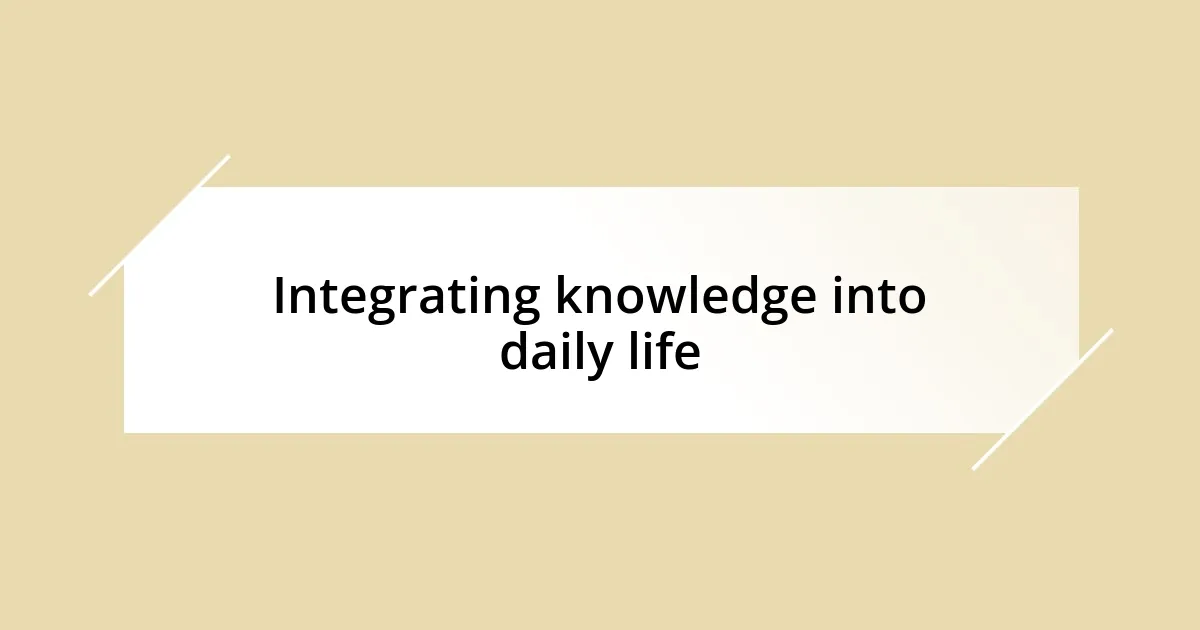
Integrating knowledge into daily life
Integrating what I’ve learned about medicinal plants into my daily life has been a truly transformative experience. For instance, I started incorporating herbal teas into my morning routine, particularly enjoying the calming effects of lavender. The first time I sipped on a homemade tea brewed from dried leaves, I could practically feel the stresses of the day melting away. Have you ever had a simple ritual turn your day around?
In my kitchen, I’ve created a small herb garden filled with basil, mint, and sage. It started as a weekend project, but watching them grow has instilled a sense of responsibility and joy. I remember the first time I added fresh mint to a dish; the flavor was astonishingly vibrant! This taught me that using medicinal plants is not just about health, but also about enriching our meals and our lives with nature’s flavors.
Moreover, I’ve begun sharing these newfound insights with friends and family, organizing little workshops on the benefits of different herbs. I recall a memorable evening when a friend said she felt empowered to try making a natural remedy from scratch after our session. It was an exhilarating realization that my journey could inspire others to connect with plants and explore their potential, too. Isn’t it amazing how sharing knowledge can create a ripple effect in our community?


